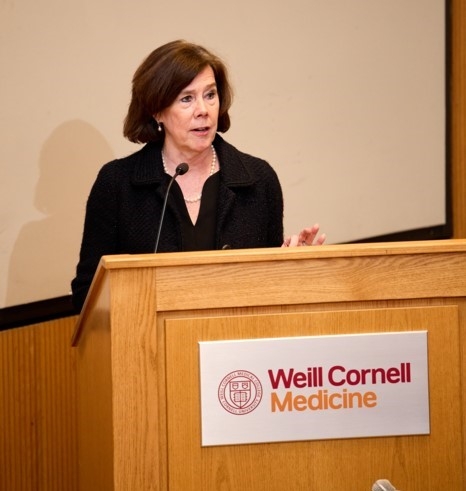Thriving as a woman in academic medicine requires blending resilience, authenticity and community while nurturing passions and people, said Dr. Helen W. Boucher, dean of Tufts University School of Medicine and chief academic officer of Tufts Medicine, in her keynote address April 10 for Weill Cornell Medicine’s seventh annual Diversity Week.
Dr. Boucher, who is also a professor of medicine at Tufts, delivered the Women in Medicine and Science lecture, “Off the Beaten Path: Thriving in Academic Medicine,” in Uris Auditorium. Her speech was part of a series of events to mark Diversity Week, which celebrates Weill Cornell Medicine’s commitment to greater equity, diversity, and inclusion in academic medicine and health care.
Weaving together data and personal reflections, Dr. Boucher contended that while women in medicine have made meaningful progress over the past several decades, significant gaps and challenges remain, from pay inequity to underrepresentation in senior roles. She highlighted the need for multidirectional mentorship as well as the importance of saying yes to opportunities even amid uncertainty.
“When my daughter was heading off to college, my advice was to ‘dare to be yourself.’ I think that still rings true today,” said Dr. Boucher, who joined Tufts in 2002 and, 20 years later, became the medical school’s first woman dean in its 130-year history. “Don’t fall into the trap of doing what others, including your professors, think you should do or should be.”

Dr. Boucher delivers the Women in Medicine and Science lecture on April 10 in Uris Auditorium.
Dr. Boucher related her zigzagging career path to exemplify there’s no single route to success in medicine. Driven by personal and family considerations, she transitioned several times between academia, clinical medicine and the pharmaceutical industry.
Heading significant projects for Pfizer, including a global new drug application, offered “big deal” experiences she hadn’t expected. But her passion for clinical care and teaching drove Dr. Boucher’s return to academia, while deep involvement in professional societies led to leadership roles that broadened her influence. All these experiences helped fuel Dr. Boucher’s contributions during the COVID pandemic, when she collaborated with other prominent Boston-area institutional leaders to problem-solve and communicate with the public.
“There’s this reality that leadership is a contact sport,” said Dr. Boucher, who completed infectious disease research fellowships at Beth Israel Deaconess Medical Center after earning her medical degree from the University of Texas. “There needs to be some healthy tension so we can get the work done. Learning how to manage conflict is really important.”
Using data from the Association of American Medical Colleges, Dr. Boucher tracked the progress and remaining gaps in gender equality across ranks, specialties, compensation and leadership roles in medicine. While 57% of medical students are now female, only between 25% and 29% of full professors, deans and department chairs are women, she said. Additionally, women are persistently underrepresented in surgery, radiology and basic sciences and still earn significantly less than men at all ranks and in nearly all specialties.
“So how do you thrive in this environment? If you’re a woman, I just told you some sobering statistics,” Dr. Boucher said. She then offered an array of “pearls” to guide women in medicine toward this goal, exhorting them to own their seat at the table, choose personal and professional partners wisely, and learn to delegate and accept criticism gracefully. Women, with their strengths in multitasking and communication, are uniquely positioned to flourish, she said.
“Don’t be afraid to say yes,” she said. “I didn’t always do that, didn’t always embrace all these changes in my life, but saying yes can be a great thing.”
Dr. Robert Harrington, the Stephen and Suzanne Weiss Dean of Weill Cornell Medicine, said every medical student and physician can learn from Dr. Boucher’s career regardless of gender, since careers in medicine are rarely linear.
While it took 128 years before Tufts University School of Medicine appointed a woman dean and more than five decades before the College of the Holy Cross—where both Dr. Boucher and Dr. Harrington earned their undergraduate degrees—to name Dr. Boucher as its first female board of trustees chair, “I think it means we’re making progress,” Dr. Harrington said. “While there is still progress to be made, people like Dr. Boucher are trailblazers and send a great message to the rest of society that this is the way things can and should be done.”

